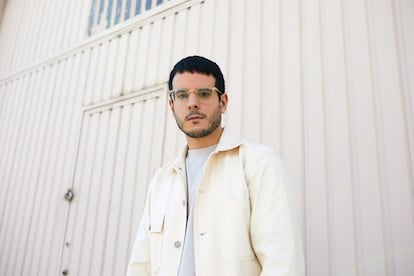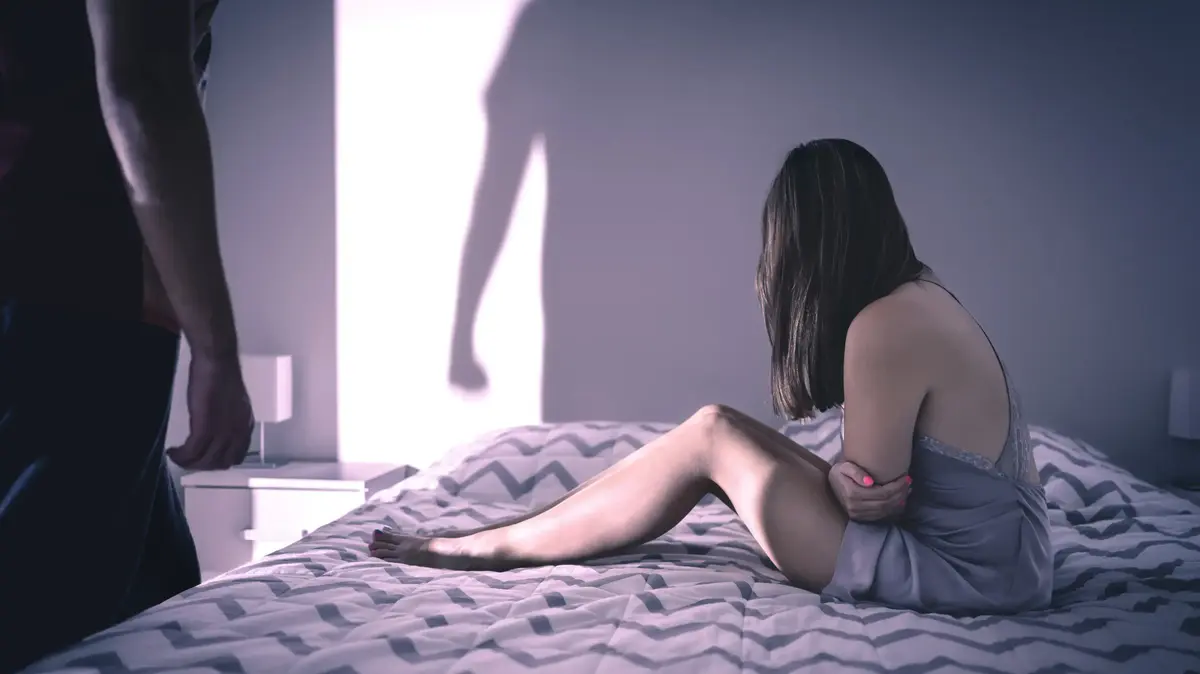They make music in Galician and unequivocally Galician.
Behind Baiuca is Alejandro Guillán (Catoira, Pontevedra, 32 years old), who on his two albums
Solpor
and
Embruxo opts
for a mixture of the contemporary and the traditional and, above all, the danceable.
In the latest edition of the MIN awards, he won the awards for best electronic music recording and best album in Galician.
He has sold out venues in Paris, toured Mexico and has concerts pending in the United States.
But first he will stop at the Paraíso Festival in Madrid on June 25.
We spoke with him in Barcelona, where he lives.
Raised between Catoira and Vilagarcía de Arousa (Pontevedra), he was always clear that he wanted to dedicate himself to music.
“Always being the protagonist at a birthday party or at school I liked.
Right away I started playing and getting on stage”.
In the process of becoming a traditional musician, he has cited as references the bagpiper Carlos Núñez, but also Golpes Bajo or El Guincho: “In the case of El Guincho it was a boom for me to see how
new music could be made with record
samplers .
I had heard it in hip hop but I never imagined it with any other type of music.
He blew my mind.”
He started out doing
synthpop
under the name Alex Casanova.
What happened to that identity?
It was a project in which he was playing a role;
the one who appeared on the stage was not me as such.
He wanted to know what he could do in pop without singing well, it was a challenge.
There comes a moment of maturity when you start with another point of view and other ideas.
When I started as Baiuca I put on a mask because I didn't know if people were going to like it.
Luckily, it went well.
Mixing electronic and traditional music creates divisions.
We tend to think that when you play the traditional, someone is not going to like it.
If you go flamenco but do something more evolved, a stir is generated.
I'm thinking of El Niño de Elche, that there are people who think it's traditional flamenco but then they go to a festival, they see that it's something else and of course… he already says so, that he considers himself anti-flamenco.
The artist Baiuca.Elisabet Encina
His music has been described in a thousand ways, from Galician electronics to music to set the mood for a coven.
What do you consider yourself?
I come from pop linked to electronics, which is what interests me the most and what I feel comfortable with.
It is a project that through electronics plays traditional and Galician themes, but with
loops
.
If 100 years ago the musicians with a bagpipe made the party, now it is done with other elements.
Something that stands out in his work is the almost total absence of bagpipes, considered the totemic instrument of Galician music.
Instead of them, she prefers to use percussion and women's voices.
The feminine universe has so much weight in the songs because it has really been the women who have maintained the tradition and have evolved it through the tambourine and traditional singing.
I like that this has been the path because Galician singing and women have been given visibility.
The bagpipe did have an important moment in the nineties.
Now we are the other way around: the bagpipe hardly has any weight in society but the song does.
When you want to find lyrics to traditional songs, you don't go looking for village ladies, but for the digital archives of the Museo do Pobo Galego or Dorothé Schubarth's popular Galician songbook.
I've had this conversation with some friends.
Is it worth going to the villages right now?
Surely there will be some ladies and some gentlemen who still maintain that essence that could be collected 30 or 40 years ago.
But why not take advantage of the previous work that other people have done before and not go back to the starting point?
Many of the songbooks are free to view and can be consulted
online
, which makes things much easier for me to create music from home.
Discover the homesickness
The project arose while I was living in Madrid.
Emigration, one of the themes that forms the backbone of Galician identity since the 19th century, has also inspired him.
In Madrid, before being able to dedicate himself exclusively to music, he had a job at Primark.
“It was my only food job,” he explains.
“I arrived in Madrid, I began to write resumes in a lot of places, it coincided with the opening of the store and they called me.
I was there for two or three years, at the last moment combining it with the concerts, which I was already
visual
and he had night shifts too… I remember that he came from playing in Bilbao, he arrived in Madrid at half past ten at night, he started work at twelve and so on and until eight in the morning.
She couldn't go on.
Keeping those two jobs for a while allowed me to save up to have a little cushion, take risks and be able to dedicate myself to music.”
“The change from Madrid to Barcelona was personal, because my partner had his family near here and we decided to come.
Nor was there anything in Madrid that tied me down to feel that I couldn't move from there.
My project has sometimes been spoken of as a Madrid project, as if the Galicians who are abroad cannot do something Galician.
I see it in many things;
there is this issue of considering that what comes from Madrid is something toxic or negative for us, and I don't know... I lived my whole life in Galicia, it was always clear to me in recent years, when I lived between Santiago and Vilagarcía, that I wanted to do this type of project and in the end it happened when I was in Madrid.
There I discovered homesickness, which was something that I had neither been interested in nor had, and suddenly it arose in me and I took advantage of it to create.
Now that I live in Barcelona I go to Galicia two or three times every month and spend a few days there, so I no longer have this feeling of homesickness, I have a different one: spending time in Galicia and also seeing it from an outside perspective.
I think that is also interesting for me to create from another point of view”.
In fact, it has managed to please Galicia as much as anywhere in Spain or even France, Italy, England, Colombia or Ecuador.
How is current Galician music received outside Galicia?
I had a stage in which I was very interested in global movements like Chancha Vía Circuito or Nicolas Jaar, artists who did something that had to do with their places of origin and mixed it with that club touch that I liked.
It served as an example to me of what I could do.
I thought: “if they
tour
all over the world and I also do a project with this relationship, why shouldn't I tour too?”.
From the beginning it was clear to me that I was not going to make music so that it would stay in Galicia.
Thanks to the possibility that their music was not only heard in Galicia, Baiuca and his group ended up experiencing the coup in Sudan in October 2021: “We went to play invited by the Spanish embassy, which was organizing a festival.
Within the experience was also meeting Sudanese artists and playing with them.
We arrived on a Sunday night, we went to bed and the next morning the security forces of the embassy warned us that there was a coup d'état;
they canceled the planes and until Friday we couldn't leave.
We stayed in the embassy residence.
But in the end it seemed that more was being talked about here: we had no connection, we didn't know anything.
When the coup took place, the first thing the military did was cut off communications, obviously.
We were isolated from the world but well,
How has the Tanxugueiras phenomenon lived at the Benidorm Festival?
It is positive that the focus is on music that was not on everyone's lips.
Contests also have to be taken calmly.
They are working well and will do very well.
I 'm thinking of
Operación Triunfo
, where artists with lots of fans and listeners suddenly come out and five months later nobody remembers them.
When you have the opportunity to have a global success you have to have a structure and a way of working that allows you to continue that project.
You have to take advantage of that loudspeaker, and they will.
He said that he goes to Galicia a lot and has a vision both from within and from without, how do you see the current moment of Galician culture?
Better every time.
There is a lot of potential and we are at a starting point.
I went to the MIN awards a couple of weeks ago and I was surprised by the number of Galician projects that were there, I think there is a boiling moment.
Do you think you will live there again at some point?
I've always thought so.
I don't know when, but at some point it will happen.
Music allows you to live anywhere, so it will be a matter of seeing how life evolves.
You can follow ICON on
,
,
, or subscribe to the
Newsletter here
.
Exclusive content for subscribers
read without limits
subscribe
I'm already a subscriber


/cloudfront-eu-central-1.images.arcpublishing.com/prisa/ENOKQHD33NAGRAFBPP45GKFJGM.jpg)









